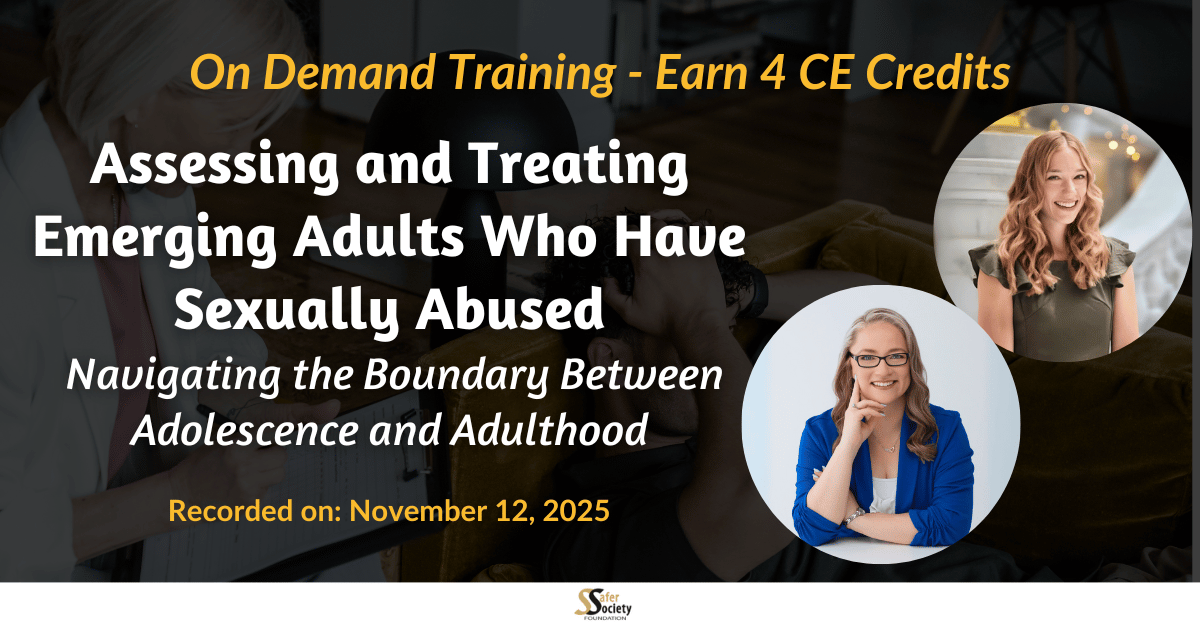
Assessing and Treating Emerging Adults Who Have Sexually Abused: Navigating the Boundary Between Adolescence and Adulthood
Already purchased an On Demand training?
Click here to access your Safer Society On-Demand Training Center account.
 Despite decades of progress in evaluating and treating both adults and adolescents who have sexually abused, working with “emerging adults” can often be less clear. These clients are typically young men between the ages of 18 and 25—in some cases, it includes individuals in their late twenties—who are developmentally between adolescence and adulthood. They often do not “quite fit” into either category. This lack of fit is especially apparent in their living situation or placement logistics and the assessment tools and treatment modalities commonly used with this population. In many cases, clients who are now considered by the courts to be legally adults were adolescents when their abusive actions took place.
Despite decades of progress in evaluating and treating both adults and adolescents who have sexually abused, working with “emerging adults” can often be less clear. These clients are typically young men between the ages of 18 and 25—in some cases, it includes individuals in their late twenties—who are developmentally between adolescence and adulthood. They often do not “quite fit” into either category. This lack of fit is especially apparent in their living situation or placement logistics and the assessment tools and treatment modalities commonly used with this population. In many cases, clients who are now considered by the courts to be legally adults were adolescents when their abusive actions took place.
Dr. Waltrip and Dr. Leslie are both experts in evaluation and treatment, with experience across diverse practice settings in the United States. In this training, they focus on how professionals can best understand, assess, and treat emerging adults. This includes the similarities and differences they share with justice-involved adolescents and adults. Areas of focus include:
- Current approaches to evaluation
- Selection and application of assessment measures
- Effective treatment methods and clinical considerations
- Additional factors, such as placement and living situations
1) Identify the characteristics of an emerging adult.
2) Describe the unique similarities and differences between juveniles, emerging adults, and adult offending populations.
3) Identify assessment techniques for mitigating an emerging adult’s risk for sexual harm.
4) Plan ways to meet each client’s needs by integrating assessment and treatment approaches.
5) Demonstrate treatment interventions to meet the individual needs of emerging adults.
Audience
This training is primarily for professionals involved in the assessment, treatment, and management of individuals with sexually abusive behaviors during the transition from adolescence to adulthood. This includes psychologists, social workers, clinical counselors, probation and parole officers, treatment providers, and other behavioral health or criminal justice professionals who work with this population.
Content Level
Disclosure
Continuing Education Approval
American Psychological Association (APA)
Safer Society Foundation, Inc. is approved by the American Psychological Association (APA) to sponsor continuing education for psychologists. Safer Society Foundation, Inc. maintains responsibility for this program and its content.
Association of Social Work Boards (ASWB)
Safer Society Foundation, Inc., provider #233, is approved to offer social work continuing education by the Association of Social Work Boards (ASWB) Approved Continuing Education (ACE) program. Regulatory boards are the final authority on courses accepted for continuing education credit. ACE provider approval period: 06/06/2025—06/06/2026. Social workers completing this course receive 4 clinical continuing education credits.
Who's Presenting

Candice Waltrip, PsyD
Candice Waltrip is an experienced Evaluator with a demonstrated history of excellent work in the forensic field. She is a member of the Board of Directors for the Association for the Treatment and Prevention of Sexual Abuse and also serves on the Utah Sex Offense Management Advisory Committee.
Candice is skilled in crisis intervention, sex offense treatment and evaluation, competency to stand trial evaluations, case management, court-ordered treatment/evaluation, trauma, mood disorders, and general psychological assessment. Candice’s doctoral education focused in clinical psychology, with concentrations in forensic psychology and psychodynamic psychotherapy from Azusa Pacific University.

